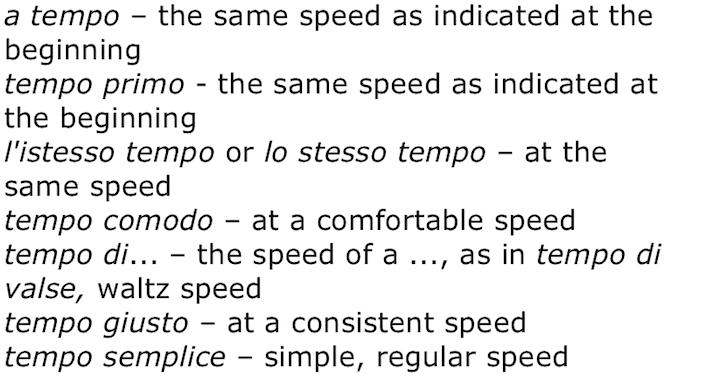Back to andrewdownes.com

Music Education
Resources by Paula Downes, a lot of music by Andrew Downes
Tempo
On this page:
Introduction to Tempo
Metronome Markings
Italian Terms
Changing the speed
Further Terms
Speed in music
Tempo markings tell us whether the music is slow, fast, at walking pace, getting faster or slower. They are written above the stave as you will see in the free videos and images below.
One way to tell a performer how fast the music should go is to use a metronome mark. A metronome mark tells you how many beats there are per minute, and what type of beats they are.
This means 80 crotchet/quarter note beats per minute.

This means 40 minim/half note beats per minute.
Watch the free video below to see demonstrations of different metronome markings:
We also use Italian terms and abbreviations:
larghissimo – very, very slow
grave – slow and solemn
lento – slowly
largo – broadly
larghetto – rather broadly
adagio – slow and stately
adagietto – rather slow
andante moderato – a bit slower than andante
andante – at a walking pace
andantino – slightly faster OR slower than andante
marcia moderato – moderately, in the manner of a march
moderato – moderately
allegretto – moderately fast
allegro – fast, quickly and bright
vivace – lively and fast
vivacissimo – very fast and lively
allegrissimo – very fast
presto – extremely fast
prestissimo – even faster than presto
Here is a free video demonstration of some of the above:
Changing the tempo
accelerando (accel.) – gradually accelerating
allargando – growing broader; decreasing speed
calando – going slower (and usually also softer)
doppio movimento / doppio più mosso – double speed
doppio più lento – half speed
lentando – gradual slowing and softer
meno mosso – less movement or slower
mosso – movement, more lively, faster
più mosso – more movement, faster (more than just mosso)
precipitando – hurrying, going faster
rallentando (rall.) – gradual slowing down
ritardando (ritard., rit.) – gradual slowing down
ritenuto (riten., rit.) – slightly slower; temporarily holding back. rubato – change the speed freely for expressive purposes
stretto – faster speed
stringendo – getting faster and faster
Here is a free video demonstration of some of the above. Note the dashed lines that show where the accel. and rit. begin and end:
Further terms
alla - in the style of (e.g. alla marcia - in the style of a march)
A piacere – the speed and rhythm are left up to the performer

assai – very much, as in allegro assai, quite fast
molto – much, very, as in molto allegro, very quick
non troppo – not too much, as in allegro non troppo, fast but not too much
non tanto – not so much
più – more, as in più allegro, more quickly
piuttosto – rather, as in piuttosto allegro, rather quick
poco – slightly, little, as in poco adagio
poco a poco – little by little
quasi – almost, nearly, as if, as in più allegro quasi presto, faster, as if presto
senza – without, as in senza interruzione, without interruption or pause
Here is a free video demonstration of some of the above:
Return to the top of the page
Home>Music Theory>Tempo

Music Education
Resources by Paula Downes, a lot of music by Andrew Downes
Back to andrewdownes.com
Follow Cynthia Downes on Instagram to keep up-to-date with her blog posts.
If you have performed in any of Andrew Downes' works or come to listen, please share your experiences in the Premieres Blog! Also see what others have said. Thank you so much for your contribution.


